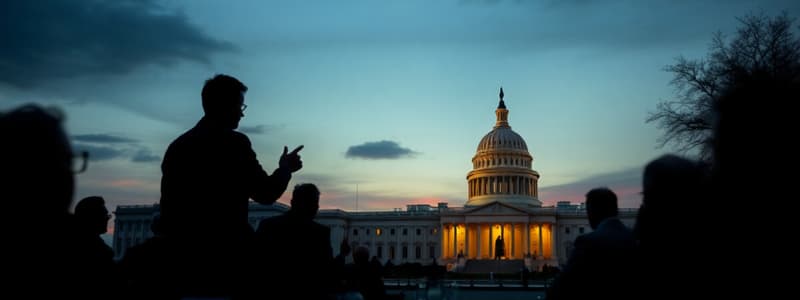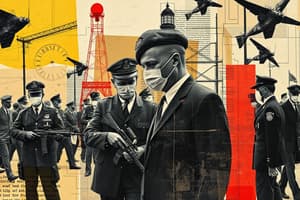Podcast
Questions and Answers
What is a common misconception individuals have regarding risks?
What is a common misconception individuals have regarding risks?
- People typically underestimate environmental hazards.
- Many overestimate risks from environmental hazards. (correct)
- Individuals accurately assess risks from lifestyle factors.
- Individuals believe lifestyle factors pose no risk.
What can significantly affect the acceptance of research findings by policy audiences?
What can significantly affect the acceptance of research findings by policy audiences?
- The timeline of the research completion.
- The clarity of the research communication. (correct)
- The affordability of implementing the research.
- The complexity of the research methods.
What is one of the reasons that researchers' recommendations may be ignored?
What is one of the reasons that researchers' recommendations may be ignored?
- Misinformation spread by competing researchers.
- The size of the research team involved.
- Lack of alignment with policy audiences' values. (correct)
- Excessive funding allocated to the research.
What often happens to high-quality research during unfavorable political contexts?
What often happens to high-quality research during unfavorable political contexts?
How can the media's portrayal of risks impact political decisions?
How can the media's portrayal of risks impact political decisions?
Which dimension of power involves the ability to control decisions directly?
Which dimension of power involves the ability to control decisions directly?
What type of authority is based on established customs and traditions?
What type of authority is based on established customs and traditions?
Which origin of power is associated with compliance based on the leader's personal qualities?
Which origin of power is associated with compliance based on the leader's personal qualities?
What is power as non-decision making primarily concerned with?
What is power as non-decision making primarily concerned with?
Legitimacy of authority is derived from which of the following?
Legitimacy of authority is derived from which of the following?
What is one characteristic that distinguishes a situation perceived as a crisis?
What is one characteristic that distinguishes a situation perceived as a crisis?
Which group is considered a powerful agenda setter in policymaking?
Which group is considered a powerful agenda setter in policymaking?
What role do media play in the policymaking process?
What role do media play in the policymaking process?
What does non-decision making refer to in policymaking?
What does non-decision making refer to in policymaking?
Which of the following factors can make a government perceive a situation as a crisis?
Which of the following factors can make a government perceive a situation as a crisis?
According to the Holly & Gunn approach, what is necessary for policymakers to address potential crises?
According to the Holly & Gunn approach, what is necessary for policymakers to address potential crises?
What is one of the challenges that interest groups face when trying to influence policy?
What is one of the challenges that interest groups face when trying to influence policy?
What can lead to changes in public policy agendas over time?
What can lead to changes in public policy agendas over time?
What function of interest groups involves widening the range of political options available to voters?
What function of interest groups involves widening the range of political options available to voters?
Which of the following best characterizes the role of professional monopolists in healthcare reform?
Which of the following best characterizes the role of professional monopolists in healthcare reform?
What is the primary goal of equal/community health advocates?
What is the primary goal of equal/community health advocates?
What does the term 'iron triangle' refer to in the context of policymaking?
What does the term 'iron triangle' refer to in the context of policymaking?
In the context of globalization, what does 'internationalisation' refer to?
In the context of globalization, what does 'internationalisation' refer to?
Which of the following is defined as goods that are globally undersupplied and produced inefficiently?
Which of the following is defined as goods that are globally undersupplied and produced inefficiently?
What is one function of interest groups related to political education?
What is one function of interest groups related to political education?
Which of the following is NOT a function of interest groups?
Which of the following is NOT a function of interest groups?
What is the primary role of the Global Compact initiative?
What is the primary role of the Global Compact initiative?
Which of the following is NOT a strategy of influence employed by the commercial sector?
Which of the following is NOT a strategy of influence employed by the commercial sector?
What function do Global Public-Private Health Partnerships (GHPs) typically serve?
What function do Global Public-Private Health Partnerships (GHPs) typically serve?
Which of the following is an example of an organization that operates independently as a GHP?
Which of the following is an example of an organization that operates independently as a GHP?
What role do GHPs play in policymaking?
What role do GHPs play in policymaking?
Which of the following best describes the purpose of the International Trachoma Initiative?
Which of the following best describes the purpose of the International Trachoma Initiative?
What is one way that commercial sectors influence intergovernmental organizations?
What is one way that commercial sectors influence intergovernmental organizations?
Which one of the following is a characteristic of GHPs?
Which one of the following is a characteristic of GHPs?
Flashcards are hidden until you start studying
Study Notes
Radical Policies and Crisis Perception
- Crises are recognized when significant policymakers perceive alarming circumstances that could lead to severe consequences.
- A situation is classified as a crisis if external pressures (e.g., economic downturns in essential exports) align with expert insights from within the government.
- Recognizing crises increases the probability of serious governmental attention toward urgent issues.
Non-Decision Making and Agenda Setting
- The ability to exclude issues from the policy agenda is equally powerful as putting them on the agenda.
- Economic elites and influential groups can suppress contentious topics, guiding public discourse towards safer, non-threatening issues.
- Effective governance requires proactive issue identification to prevent crises, considering environmental, technological, and demographic factors.
Interest Groups and Their Roles
- Various entities, including civil society, NGOs, and corporations, serve as agenda setters alongside the government.
- Interest groups facilitate citizen participation, diversify policy options, educate the public on political processes, and mobilize efforts for change.
Media Influence on Policy Agenda
- Media provides a platform for marginalized groups to reach policymakers and the public, although not all issues receive equal attention.
- The issue attention cycle reflects how public focus can shift dramatically, impacting which topics are deemed newsworthy.
State Power and Authority
- The state encompasses more than just government, including various institutions like the parliament and judiciary.
- Three dimensions of power: decision-making, non-decision making (agenda-setting), and thought control (influencing perceptions through media).
- Authority types include traditional, charismatic, rational-legal, and technical, each deriving legitimacy from different sources of trust and societal norms.
Challenges in Policy Making
- Research findings are often downplayed if they contradict policymakers' agendas or existing narratives.
- Risks are perceived differently; people frequently overestimate environmental hazards while minimizing lifestyle risks.
- The timing and political context heavily influence whether research is acknowledged and acted upon by decision-makers.
Structural Interests in Healthcare
- Professional monopolists, such as doctors, resist reforms that threaten current systems, while corporate rationalizers push for efficiency and cost-cutting strategies.
- Community health advocates fight for equitable access and representation within healthcare decision-making.
Globalization and Policy Processes
- Global civil society consists of groups aiming for international goals, emphasizing interconnected challenges in health and policy.
- Global public goods are undersupplied and inefficiently produced, requiring collective action beyond state capabilities.
- Globalization fosters cross-border interactions, influencing health policies through corporate pressure and lobbying efforts.
Global Public-Private Partnerships
- Collaborative health partnerships involving public, private, and civil society aim to address health issues collectively.
- Functions of these partnerships include research and development, improving medication access, mobilizing funds for health initiatives, and influencing health policy priorities.
- GHPs leverage diverse expertise and resources to advocate for strategic health policies, filling roles often associated with traditional governance structures.
Studying That Suits You
Use AI to generate personalized quizzes and flashcards to suit your learning preferences.




